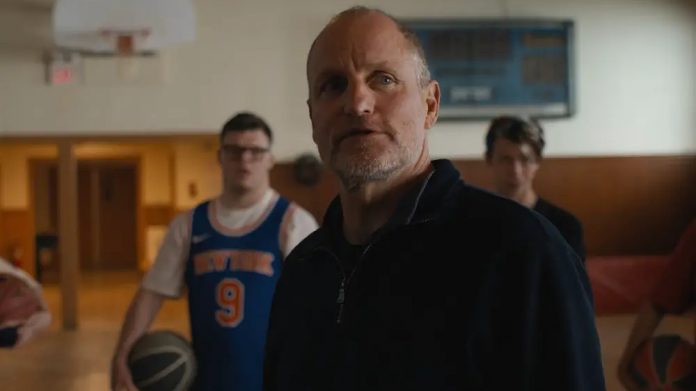For a good portion of the ’90s and 2000s, the Farrelly brothers were Hollywood’s go-to filmmakers for low-brow humor thanks to their early films such as Dumb and Dumber, Kingpin, and eventually, 1998’s R-rated comedy blockbuster There’s Something About Mary.
After the siblings made the 2014 sequel Dumb and Dumber To, Peter Farrelly went off on his own to direct Green Book, which won Best Picture and made some think that the era of the “Farrelly Brothers” was over. In fact, the duo would go on to split directing duties on the Amazon series Loudermilk, though Bobby Farrelly is now making his solo feature directing debut with Champions, which reunites him with Kingpin star Woody Harrelson, who is joined by the terrific Kaitlin Olson from It’s Always Sunny in Philadelphia.
Harrelson plays Marcus, a minor-league basketball coach in Iowa who dreams of coaching in the NBA but instead gets fired and pulled over for a DWI. His punishment of community service sees him taking over as coach of the “Friends,” a basketball team made up of adults with IDD (intellectual and developmental disabilities), who could really use someone who believes in them, even if it takes some time for Marcus to warm up to the team.
Champions is a tough movie to talk about, not due to spoilers or such, but because any discussion of Harrelson’s co-stars requires a bit more sensitivity than in the Farrellys’ heyday, back when no subject was too taboo to joke about on the big screen. Adults with intellectual and developmental disabilities are often misunderstood and have to deal with preconceived notions that aren’t true, notions that Farrelly’s talented cast is able to disprove in Champions, which is every bit as crowd-pleasing as CODA.
Above the Line hopped on Zoom with Farrelly to have the following conversation about making Champions, and how Harrelson was a true mensch to his admiring co-stars.
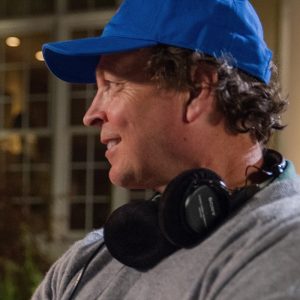
Above the Line: This is hard to believe, but I’ve been interviewing filmmakers for almost 20 years and I’ve never met or talked to either you or your brother. I have no idea why.
Bobby Farrelly: The streak is over.
ATL: I’m not much of a sports guy, so I was a little nervous when this movie opened with a basketball game, but I wound up really enjoying Champions, which turned out to be a very different film than what I was expecting.
Farrelly: Well, thank you, Ed. [With] the genre of sports movies, obviously, this falls into that to some degree, because Woody’s character, Marcus, is a basketball coach, and the young people in the movie are playing basketball, but we wanted to make it where it’s not just a sports movie. It’s more about human beings and meeting people [who] you don’t know anything about and finding out that they — in this case, the community of people with intellectual disabilities — [are] a lot different than Woody’s character had anticipated. He was going in just [on] his preconceived notions, which proved to be all wrong to him.
ATL: What made you interested in this project, and why did you decide it was the right script for your solo directing debut?
Farrelly: In 1996, my brother Pete and I made the movie Kingpin with Woody Harrelson. We love working with Woody, and we were actually buddies with him beforehand. We had the advantage of knowing him a little bit, and we’ve been friends with him ever since. But we love working with Woody. Over the years, we kept thinking, “what else can we do with Woody?” and for whatever reason, we didn’t find the right vehicle, or he was working when we found something. It just didn’t work out.
Woody found this Spanish movie, Campeones. I didn’t know anything about it. He saw it somewhere, and he absolutely loved it, and he wanted to remake it. He brought it to me and said, ‘I’m very passionate about this.’ There actually happened to be a really good screenplay written by [this] guy, Mark Rizzo. He adapted the original movie in a beautiful way. He took the best parts of the original one, but he also put in a lot of his own original elements. [With] the combination of Woody being passionate, a great original movie [in] Campeones, and a really nice [adapted] script, I was like, “Alright, how am I going to turn that down?” So that’s how I got in.
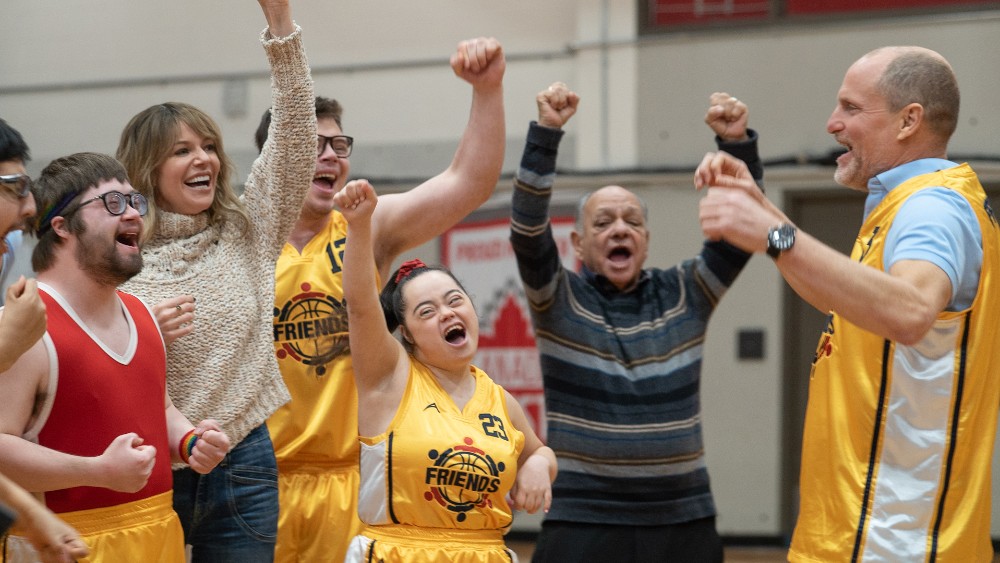
ATL: Was that original Spanish film based on a true story?
Farrelly: I did hear that. I didn’t really communicate too much with the original Spanish [team], because I wanted to treat this one like it was an original, but it is adapted from their movie, which was fantastic. It was a little bit different, tonally, I think then, than what we did, but it was a great movie. I did hear that the writers, who had written that story, [had] based [it] on one of their actual life experiences, and it felt that way. The people in it, the basketball players, the team with the disabilities, they all felt very real to me. I liked all those guys, and I like that they were very funny. But I never felt like I was laughing at them. I’m laughing with them. I’m laughing with the team and their experiences. In our story, Woody’s character, Marcus, the basketball coach who aspires to coach in the NBA, he’s kind of the brunt of the jokes. He’s the one who has the most learning to do, so most of the jokes are directed at him. Anyway, [there are] lots of laughs [that aren’t] directed at anyone [and aren’t] mean-spirited in the least.
ATL: I’m sure you’ve been asked this before, but I tend to watch There’s Something About Mary maybe once every couple of years, and of course, there’s the character of Warren. I’m not sure you could make that movie today the same way that you did back then. You’d get a lot of flack having an able actor playing a mentally-challenged person, don’t you think?
Farrelly: Well, that’s true, and during that time, we didn’t think that you had to have an actor with a disability playing a character with a disability. Nowadays, we do. We’ve met so many people in the disabled community that we understand now, more than we did then. I think the whole world does. That community, first of all, they’re not represented enough in movies. They’re wildly underrepresented. Whatever percentage they are in society, and it’s pretty significant — around 15 to 20 percent of people are under the umbrella of “disabled.” Well, in movies, it’s a very small fraction, They’re always sort of played stereotypically, so they don’t get the chance to act in these movies, and they don’t get a chance to act in other non-disabled roles. The point is [that] if there is a disabled character, [they] should be played by a disabled actor. We realized that, and it helped me so much in this movie [in terms of] hiring people with intellectual disabilities to play characters with intellectual disabilities — because it’s not some facade. I tried to get these people and capture what is interesting, and funny, and humorous, and what’s captivating about the actor themselves, and [that] came through.
ATL: The Friends are all pretty amazing. They all have different personalities and great individual moments. How did you go about finding them? Was Mark’s screenplay pretty specific about each one of the characters, or did you have a little room to find the actors and alter the script to accommodate their unique talents and abilities?
Farrelly: The screenplay did have 10 different characters, and it sort of explained what it was about each character that was interesting. We didn’t know who would play these parts, so we did an open casting call. The one thing that we did, which I think was smart, [was that] I kind of followed that formula they did in the movie Miracle, the one about the Olympic hockey team, where in that movie, they actually went out and found really good hockey players. They thought, “It’ll be easier for us to teach them how to act than it will be to teach actors how to play hockey. You’ll know that they’re not Olympic-caliber hockey players if we go that way.”
[So] what we did is, we wanted to find young people [who] were really passionate about basketball. We looked all over the U.S. and Canada. We went to all the intellectually-disabled rec leagues and asked people if they had anyone who was really good, who might want to audition for the role. We got hundreds and hundreds of auditions, and we found these 10 actors and these were the 10 best, but as far as the original script goes, I had to allow these actors to play their version a little bit closer to how they are in real life. That’s what helped me. I didn’t want someone to go against their type. We had to make a little bit of [an] adjustment on the fly, but certainly, the original script was a great starting point.

ATL: I was curious whether you went to the American Special Olympics team and scouted players you thought could act or who might be comfortable in front of the camera.
Farrelly: Not everyone who can play basketball is an actor, or can act, but the ones who responded to our offer [could]. We got the word out that we were looking for people who play basketball who might be interested in acting, and the ones who responded were people who, [there was] something about themselves [where] they just thought, “I’ve always wanted to act, ” and of the 10 we got, we found some real actors.
The girl Madison Tevlin, who plays Constantino, she’s a legitimate actress. She’s a movie star. You can put her in a lot of movies, and she’s going to steal the scene. She’s really good. As is Kevin Iannucci, who played the brother in this. That young man’s got chops. I mean, he really does. He can understand a scene, he can memorize his lines. He can bring things to me, the director, and say, “Hey, what if I did this? What if I did that?” He was every bit as good an actor as I’ve ever worked with for a beginner.
ATL: I was also curious whether you had some room for the Friends to improvise, or to bring things from their own personalities in the event that they say something that’s actually funnier or more profound than what’s on the page.
Farrelly: The more real we kept it, the funnier it was, yes. It’s gonna be a lot better if they feel free to roam and just be themselves because they are [funny]. When you put these 10 actors together, funny stuff happens. They’re just having so much fun that it becomes funny. They loved Woody, and they loved interacting with them. I couldn’t just stick to the written word. I had to let them improvise a little bit, and I’m really glad I did.
ATL: How involved was Woody in the casting process? Was he available to spend time with them, once you picked out the actors you liked, just to see how they got along?
Farrelly: Woody wasn’t there when we were casting [the movie] itself, but every one of those actors knows Woody from all the movies he’s done; Woody is an icon. They love Woody, and when Woody came on set, the rapport between him and the basketball team was magic. This was Woody at his best in this particular movie. He was so generous as an actor to his co-stars. He knew a lot of these people had never acted before, and on the day, he would tell them to go back a couple of lines, do that again, and then they’d redo it. He was doing a lot of the work that otherwise I would have had to do. He was such a help to me, Woody. He was absolutely at his best, and he really shined for me in this movie.
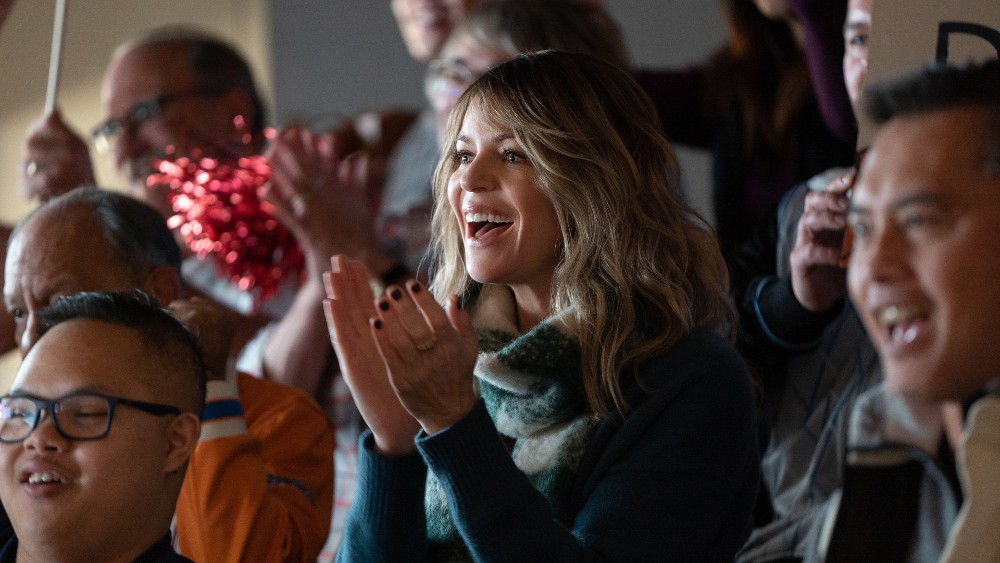
ATL: Was it his idea to cast Kaitlin Olson as his on-again/off-again love interest, or yours?
Farrelly: I’m not giving him credit for that one. That was my idea. I love Kaitlin Olson. I love her TV show [It’s Always Sunny in Philadelphia] — it’s been on for 18 years. They’ve done more funny stuff than they get credit for it. In fact, if I’m right, in 18 years, they’ve never won any award for anything. [Note: The show has received three Primetime Emmy nominations for Stunt Coordination.] How do you stay on the air for 18 years, and have a following like they have and not get recognized that there’s some good writing going on or some good acting? I think her Sweet D character on the show is great. It’s a lot different than what she plays in our movie here. I’d never seen Kaitlin in a movie or playing a different kind of character like that, so when we got her, I was jumping through hoops because I’ve always wanted to work with her and she really blew me away. She’s a very, very talented actress, and [has a] much [broader] scope and dimension than you would think just [based on] the TV show.
ATL: Was Mark’s script originally set in Iowa, and did you actually end up shooting there?
Farrelly: Mark set the script in Iowa. I never did figure out exactly why. I think what he’s trying to get across is that it was in the heartlands, middle America. He’s a long way away from New York. He’s a long way away from L.A., and Woody’s character, Marcus Marikovich, was working — grinding, as coaches do, in the minor leagues of basketball, and in the heartland. He wanted to be in the big city. He wanted the glitz and glamour of being in the NBA. I think it was that feeling. But we didn’t shoot in Des Moines. We went up to Winnipeg, Canada, but it was a pretty good match for Des Moines. Someone else made that decision. I’m sure it had to do with tax credits and all that kind of stuff that goes on. We went to Canada, and we had a great crew and everything was great. They were very nice to us up there, but it worked perfectly for our story.
ATL: I was wondering about that because I wasn’t sure what kind of infrastructure you would have in Iowa. Obviously, they make a lot of movies and television shows in Winnipeg.
Farrelly: Yeah, we did look. Winnipeg and Des Moines have similarities. I think maybe the beauty of having it in Des Moines, too, is that outside of Iowans, people don’t really have a strong impression of exactly what it looks like. It feels [like] Midwestern and Middle America breadbasket-type stuff, but [Winnipeg] worked great for us.
ATL: But it’s also very cold in the winter, so that must have not been that much fun.
Farrelly: Winnipeg is one of the coldest places I’ve ever been. What it did for us is it made shooting some of the outside scenes a little difficult, of course, but what it did is [that] it was so cold, it had a way of bringing the team and the players [together, because] you almost had to huddle together. And it helped with the bonding because we were all going through it.
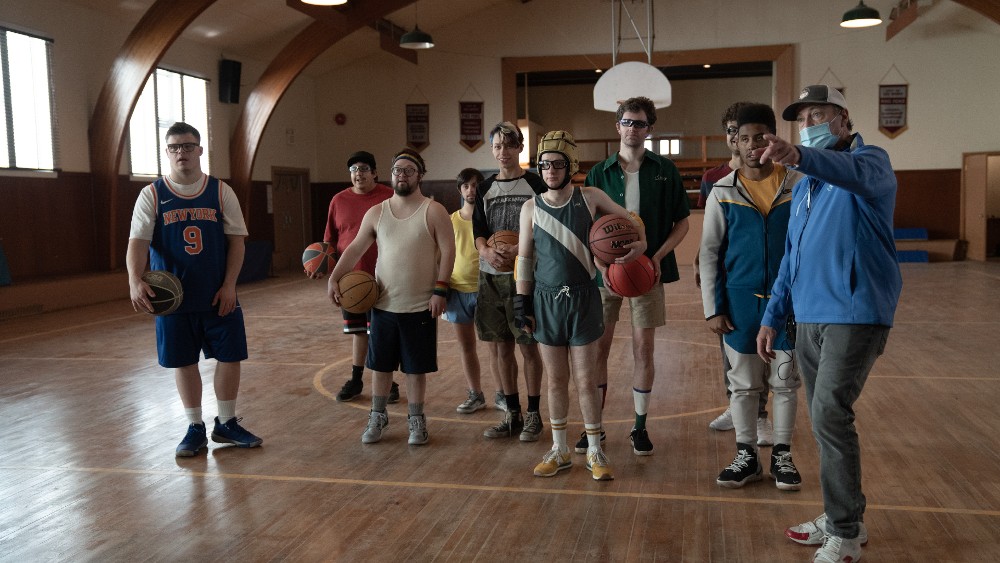
ATL: Speaking of bonding, you have another musical dance number over the end credits for this one, ala Something About Mary. As a film critic, I can be cynical about those kinds of things, but I have to imagine it helped with the bonding as well since it does look like everyone is having a blast. When did you schedule that during the shoot?
Farrelly: You know what it was? We did it on the last day of the shoot when there was that feeling like we’d already shot this movie, and the last day of shooting is always like the last day of school. There’s a lot of joy on the set, and everyone’s in a really good mood, so it was a perfect day to shoot that scene. It was the music itself, about getting knocked down. “I get knocked down but I get up again, they’re never gonna keep me down.” That perfectly represented our Friends, ’cause that’s what they are in real life. These are people that… it’s not easy, sometimes. It’s not easy for them, but they get right back up, and they don’t feel bad for themselves. And they’re a very cool group of people.
ATL: I have to give Focus some credit for actually using that song in the trailer, because the trailer is great, and it really represents the warmth and the humor of the movie, which trailers aren’t always able to capture.
Farrelly: We made the movie with this company called Gold Circle Films, and they were great producing partners for me because they really gave me everything I needed. They ended up being in bed with Focus Features, and they’re really smart, too. They’re over at Universal, and they put the trailer together, and I was very happy with the trailer they put together. Here’s the thing. They have this movie, it’s a sports trope, it’s Woody with people with intellectual disabilities. You’re going to have preconceived notions [of] what it’s about, but I think when you go see the movie, you’re going to realize that it’s fun, and it’s a beautiful story. It’s very heartwarming [and] funny, and I’m just very proud of it.
Champions is now playing in theaters nationwide courtesy of Focus Features.


